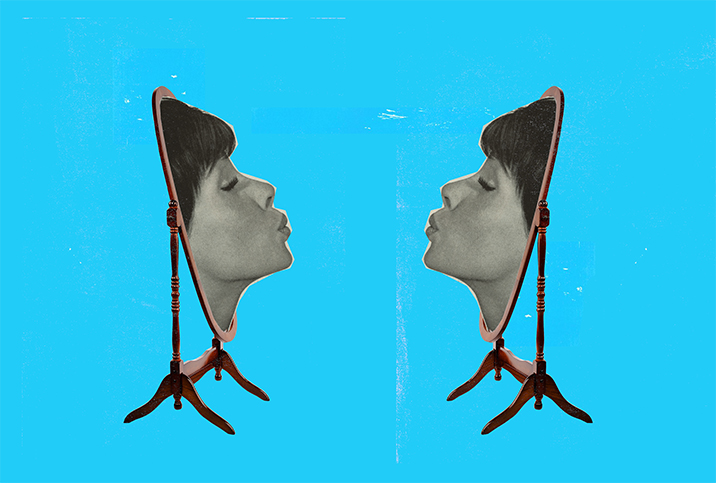Simply Irresistible: The Science of Attraction

We've all felt it, the irresistible sensation of sexual attraction. Merely standing next to a person or seeing them across the room, we may feel the pull of desire. This isn't getting to know someone over time, this is instant arousal, a feeling of slight euphoria, an accelerated heart rate and a rush of blood that can't be ignored.
As described perfectly in the 1972 movie "The Godfather" when Michael Corleone first glimpses his wife-to-be, one of his bodyguards says, "I think you got hit by the thunderbolt."
But can we really explain why we desire one person over another?
There are the age-old adages that "opposites attract" and "blondes have more fun." Actually, it's our brain pathways triggered by our senses, and our social and cultural habits that dictate the objects of our attraction.
Desire at first sight
"When it comes to physical attraction, much of what we're attracted to is hardwired," said Gary W. Lewandowski Jr., Ph.D., professor and former chair in the department of psychology at Monmouth University in New Jersey. "For example, research shows that we register attractiveness in milliseconds and that there are specific dimensions of facial features that we find attractive."
According to evolutionary psychology, attractiveness "relates to qualities that are most likely to promote successful reproduction and child-rearing." For example, research shows men prefer a woman with a waist-to-hip ratio of 0.7—that is, a bit curvy—because it corresponds with fertility. In contrast, women are supposed to prefer men with a 0.9 shoulder-to-waist ratio—or an inverted triangle—because broad shoulders ostensibly indicate strength and protection.
"There's also a lot of research showing widespread agreement about who we do—and don't—find attractive across men and women, cross-culturally and across young and old," Lewandowski explained. "This further suggests that physical attraction is more hardwired. That said, there is also subjectivity to specific factors. For example, some people like tattoos, others don't, etcetera."
However, what we find attractive extends beyond what we see. In multimodal research, studies have found a person's voice and body scent, even at a distance, help form our first impression of someone. In our integration of sensory values, people may perceive attractiveness in various ways. For example, a person may be attracted to someone's physical features but not their voice. Or a person's facial features may attract a potential partner initially and this attraction is heightened by the person's pleasant body scent.
Attraction is its own reward
Studies have shown facial attractiveness initiates romantic desire and thoughts. As we continue to study a person or their photo, our body's reward system ignites and dopamine is released from our midbrain to our brain's other regions. We immediately feel pleasure and euphoria.
Ryuhei Ueda, Ph.D., assistant professor at the Institute for the Future of Human Society at Kyoto University in Japan, studies how cognitive and neural mechanisms build and maintain our romantic relationships.
"Neuroscience [research has] revealed that the reward system responds to a positive stimulus and motivates us to maintain a specific behavior to achieve it," Ueda explained. "This function is thought to be automatically activated in many cases, including initial attraction to someone. In my recent work, I reported that the reward system recognizes the committed partner in a different way from nonpartners. On the other hand, it remains unclear how this initial attraction conveys into the calculation of romantic attraction in our brain. To solve this issue, longitudinal surveys would [need to be performed]."
Next-level attraction
We are complex beings, so even though we feel the rush of attraction for someone, other factors may dictate they will not be our next romantic partner.
"If the potential partner is already in a close relationship, you might refrain from approaching that person or you would be engaging in mate poaching," Ueda said. "This example represents the conflict between [sex] drive and [self-]regulation."
"We're able to shift our initial impression based on additional information," Lewandowski explained. "In my own research, learning a person has positive personality qualities—for example, they're kind, funny, intelligent, etcetera—leads that person to appear more physically attractive and appealing as a dating partner. Though physical attraction always has its appeal, as people age and gain more relationship experience, they begin to value those interpersonal qualities more. Ultimately, the success of a long-term relationship has more to do with enjoying each other's company and being able to hold a conversation than physical attractiveness."
Attraction can also be caused by specific circumstances, according to some classic studies of attraction. Findings in a 1950 proximity study followed residents of Massachusetts Institute of Technology (MIT) dormitories and determined the closer they were physically, the closer they became emotionally. And winning the affection of your partner has greater reward value than being with someone who always found you attractive, according to a 1965 gain and loss of self-esteem study.
The future of romance and desire
As times change, cultural norms of what we may find attractive do, too. Though attraction may continue to be based on traits that help our survival, we are also influenced by society and culture.
"As we become more technologically advanced, physical strength in men may not be as valued going forward," Lewandowski said. "However, given the rise of pandemics, those focused on healthy living and active lifestyles may be especially attractive. We already saw some of this on dating sites where users were searching specifically for vaccinated partners."
What about the idea of opposites attracting?
"The research really doesn't support that," Lewandowski noted.
"Rather, it's more a situation where opposites may attract—at first—but then they attack," he added. "Someone who is truly different than you will be difficult to get along with, and this naturally leads to greater friction and conflict."
Eventually, we may be able to partially explain our attraction to certain people, but we may never be able to predict who we fall for head over heels. Perhaps the uncertainty is what makes them "simply irresistible."


















